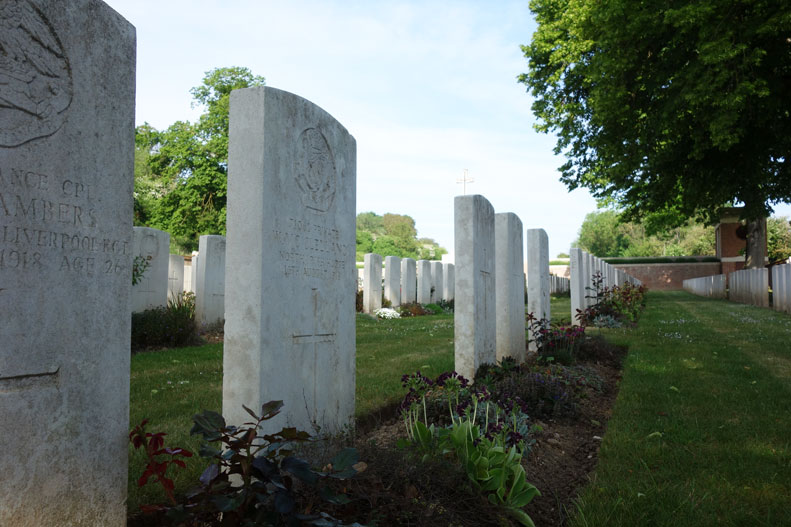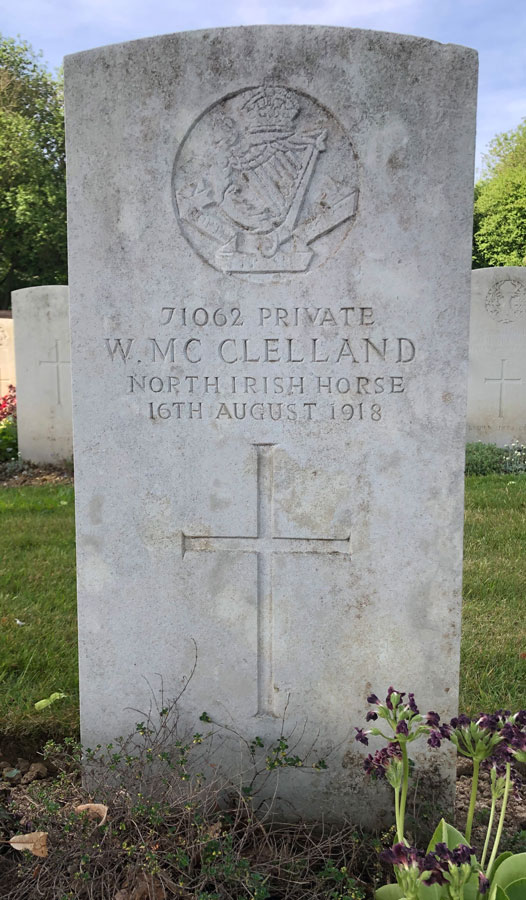![]() In memoriam
In memoriam ![]()
Private Charles Wesley McClelland
Charles Wesley (or Wellesey) McClelland was born on 31 January 1890 at Oldtown Street, Cookstown, County Tyrone, the seventh of thirteen children of baker Sloan McClelland and his wife Sarah (nee Burton). By 1911 he was living with his family at 14 William Street, Cookstown, and working with his father as a baker.
McClelland enlisted in the North Irish Horse at Cookstown between 28 January and 16 February 1912 (No.663 – later Corps of Hussars No.71062). He embarked for France with A Squadron on 17 August 1914, seeing action in the retreat from Mons and advance to the Aisne.
A number of letters sent home by McClelland were published in the Mid-Ulster Mail. On 19 December 1914 it reported that:
In a letter received last week from Trooper Wesley McClelland at the front, by his relatives in Cookstown, he says that some of the parcels sent to him had arrived, but at least one had mis-carried. He goes on to say that Sam Brown was with him, but had gone away again to rejoin his own squadron. He hears that another squadron of the North Irish Horse is going out from Derry, but he is not sure if that is true. There are six of the Cookstown troop with him, so it is not so bad. The weather is not cold, but it is very wet, as rain has fallen almost continually for the past two weeks. There is not much fighting where they are, but the Russians are still at it. He adds – "The Germans are done for, and they know it, and it is quite a common sight to see them throwing down their guns and giving themselves up." He winds up by saying he is still keeping fit. In a letter to his younger brothers he thanks them for presents, and fears they must have put in a bit of savings to buy such a lot of nice stuff, but he will try and make up for it when he returns home. He hopes they are still at school, and adds – "There are hundreds of children in this country who have not the chance, as their schools have been wrecked by the Germans, so you should be thankful you are not living here." He concludes this letter by hoping they are working hard at home to make up for his absence.
On 2 January 1915 the Mail reported that:
Trooper Wesley McClelland, writing from France to his father, ... says:– There has been lots of rain, however, we don't complain, as we will likely have worse before the war is over. It is terrible to see the wrecked homes and innocent blood on every hand – just the same scene everywhere we go. People should be very thankful they are not living in this country. Thanks for pipe and tobacco received alright. It is quite a change from what we have been getting. Many a poor unfortunate German would be glad of it. We come across them starving from cold and hunger, and have no trouble taking them in as prisoners. They come along and throw down their arms and put up their hands. You should see them turn all the colours of the rainbow when we present the bayonet to them. We have been taken back from the frontier and are at present doing body guard to General Sir John French, which is a great honour to this squadron. The British have done splendid work on this side. I have had three different mounts since I left Dublin. I have got nearly all the parcels now, and am pretty well off for clothing, &c., so don't send any more until I let you know. There are six of the Cookstown chaps at this place and all are well. The French are very kind to us, often giving us hot coffee at 5 o'clock in the morning after we have done patrol all night. Thanks for penknife which is very useful. Kind Irish friends keep us in a supply of cigarettes and other requisites.
... and on 23 January 1915:
Trooper Wesley McClelland ... has sent home to his sister for safe keeping as mementoes - a German soldier's cap, a German coin, Princess Mary's Christmas card, photo, and cigarette box. Trooper McClelland reports himself as feeling fit.
On 2 October 1915 Mail reported that:
Trooper W. Cunningham, North Irish Horse, whose home is in Drapersfield, arrived home on the 16th for a short leave, and left again on the 20th. he went out to France with the first contingent, and saw a good deal of fighting in the earlier stages of the war. During recent months he has been on Sir John French's bodyguard. He was looking very fit and in good heart, after over a year on active service. His immediate chums in France are Troopers Wesley McClelland, Hiram Irwin, John Marks, Joseph MacKenzie, Wm. Anderson, and A. J. McKenna, and these were all well when he left.
McClelland remained with A Squadron through most of the war. In May 1916 A Squadron joined with D and E Squadrons to form the 1st North Irish Horse Regiment, and in February-March 1918 the regiment was dismounted and converted to a corps cyclist regiment, attached to V Corps.
From 14 to 16 August on the front occupied by V and IV Corps, the Germans pulled back from a six-mile bulge in the line north-west of the Ancre, giving up Serre and Beaumont Hamel. Men of the North Irish Horse joined the pursuit, putting into practice their advance guard training. On 16 August they lost one man on the west bank of the Ancre, Private McClelland.
McClelland was buried near where he fell, south-east of Beaumont-Hamel (map reference 57.d.Q.18.a.2.5), the location marked with a cross. After the war his body was exhumed and re-buried at the Ancre British Cemetery, Beaumont-Hamel, Somme, France, grave VII.E.56. The gravestone inscription reads:
71062 PRIVATE
W. MC CLELLAND
NORTH IRISH HORSE
16TH AUGUST 1918

Images Copyright © Phillip Tardif with all rights reserved as set out in this Use of Material policy.

